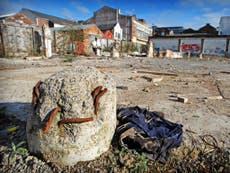Classic British sitcoms like Fawlty Towers and ‘Allo ‘Allo! ‘contributed to Brexit vote’
The shows reveal the ‘core differences between Britain and her European neighbours’, historian says
Your support helps us to tell the story
From reproductive rights to climate change to Big Tech, The Independent is on the ground when the story is developing. Whether it's investigating the financials of Elon Musk's pro-Trump PAC or producing our latest documentary, 'The A Word', which shines a light on the American women fighting for reproductive rights, we know how important it is to parse out the facts from the messaging.
At such a critical moment in US history, we need reporters on the ground. Your donation allows us to keep sending journalists to speak to both sides of the story.
The Independent is trusted by Americans across the entire political spectrum. And unlike many other quality news outlets, we choose not to lock Americans out of our reporting and analysis with paywalls. We believe quality journalism should be available to everyone, paid for by those who can afford it.
Your support makes all the difference.Classic British sitcoms such as Fawlty Towers, Dad’s Army and ’Allo ’Allo! contributed to the Brexit vote, an academic has claimed.
Professor Gavin Schaffer said the tone of the shows provided a partial insight into the identity and political culture which led to the country voting to leave the European Union in 2016.
Much of this centres on British attitudes to its European neighbours, with large parts of the UK’s Euroscepticism having “never strayed too far from suspicions rooted in the second world war”, he said.
Pointing to Allo ‘Allo!, the University of Birmingham academic claimed it “reveals a story of a nation that remains unready for further European integration”.
He claimed the 1980s show – which centres on the trials and tribulations of René Artois as he runs a cafe in Nazi-occupied France – “ultimately spoke to the core differences between Britain and her European neighbours”.
“The show also tells us something about how British attitudes to Europe were changing and not changing in the late 80s and early 90s, as Britain edged closer to her European neighbours,” he told The Guardian.
“What lurks in the shadows is a nation deeply ill at ease with its European neighbours and itself.”
A distrust of Europe was deliberately set up as the elephant in the room in Fawlty Towers, he wrote in the Bloomsbury book British Humour and the Second World War: ‘Keep Smiling Through’.

Broadcast after the 1975 referendum where the UK voted to remain in the European Common Market, Basil Fawlty tells one guest: “I didn’t vote for it myself, quite honestly. But, now that we’re in, I’m determined to make it work.”
Meanwhile, the stars of wartime comedy Dad’s Army are portrayed as an exemplar of British characters triumphing over European foes, he said.
In a more modern context, the continuing affection for the shows’ sense of humour points to a “British blind spot about the legacy of the war and the barriers between Britain and the rest of Europe”, Prof Schaffer added.




Join our commenting forum
Join thought-provoking conversations, follow other Independent readers and see their replies
Comments